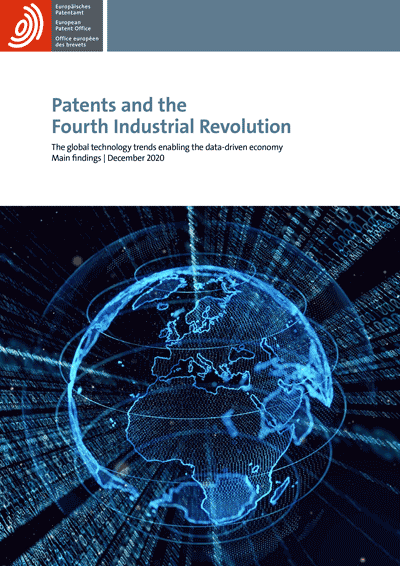
Innovation in technologies of the fourth industrial revolution has accelerated significantly and accounted for 10% of patenting activity worldwide in 2018, according to research by the European Patent Office.
Global patent filings for these technologies which include the internet of things, big data, 5G and artificial intelligence, grew at an average annual rate of almost 20%, almost fives times as fast as the average for technology overall.
The leading countries for industry 4.0 innovation between 2000 and 2018 were the US, Japan, South Korea, China, Germany, the UK and France.
The study, Patents and the Fourth Industrial Revolution – the global technology trends enabling the data-driven economy looked at high-value inventions for which patent applications had been filed at two or more patent offices globally. Nearly 40,000 such filings were made in 2018 alone.
The study finds that the US remains the world leader, accounting for around a third of all Industry 4.0 inventions filed between 2000 and 2018, with Europe and Japan with about one-fifth each. Germany produced 29% of Industry 4.0 patents generated by European companies over the same period, more than twice the UK, with 14.3%, followed by France with 12.5%. However, the average annual growth of Industry 4.0 innovation in these three countries since 2010 has been well below the world average of 19.7%, with 15.4% for the UK, 14.9% for Germany, and 11.9% for France. The fastest growing European countries was Sweden, on 22.6%.
Innovative activity in China and South Korea increased at an average annual rate of 39.3% and 25.2% respectively from 2010 until 2018.
The contribution of the UK appears evenly distributed across the three sectors of core technologies, enabling technologies and application domains, the study says. In contrast, many other European countries are characterised by a relatively low level of patenting in core technologies.
The study also shows that innovation is concentrated in regional clusters. The ranking is topped by 13 Asian and US clusters, followed by seven in Europe and the Middle East. London, at number 16, accounted for 1.1% of global Industry 4.0 patent applications.
“Constellations of smart, connected devices, faster wireless internet, big data and AI are transforming the global economy and having a profound impact across many sectors, from manufacturing to healthcare to transport,” said EPO president António Campinos. “What we are seeing is a major shift towards a fully data-driven economy.”
The study can be downloaded at epo.org/trends-4IR

